On this page: Skip top navigationKnow Your Terms | Moms' Mental Health Matters | Pregnancy For Every Body | Shareable Links
Know Your Terms
Know Your Terms - Print Materials
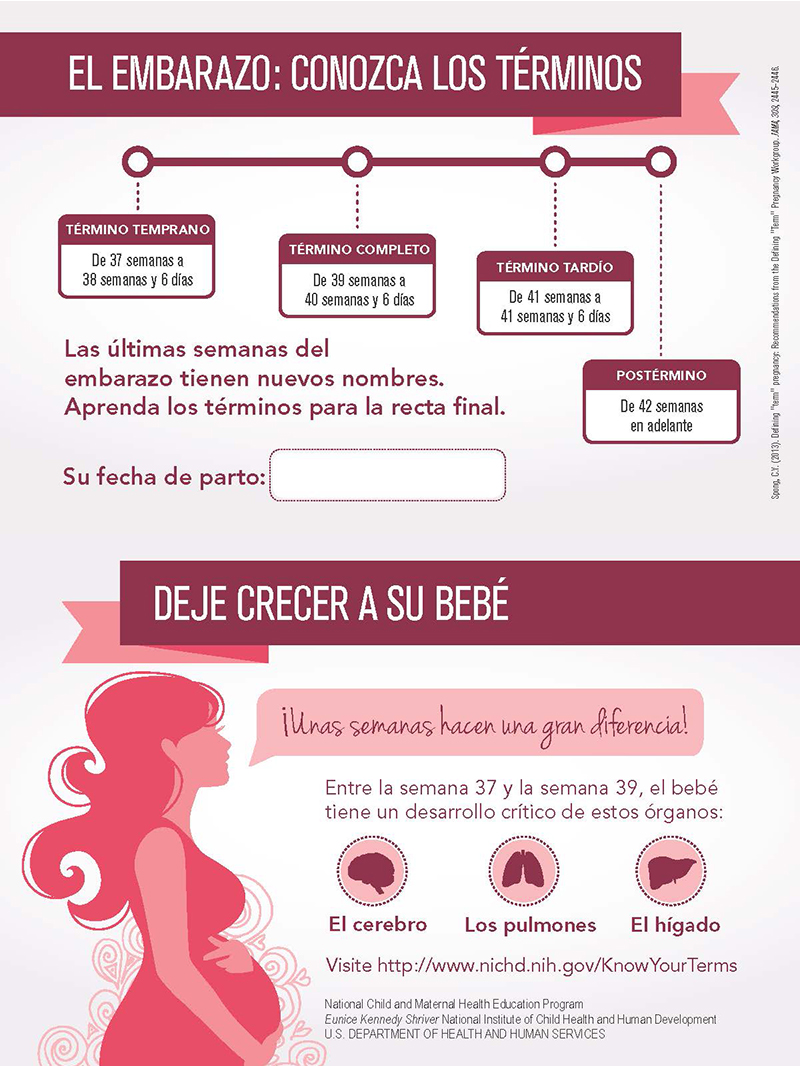
Libreta con hojas desprendibles: “El embarazo: Conozca los términos" (50 hojas por libreta)
Texto alternativo
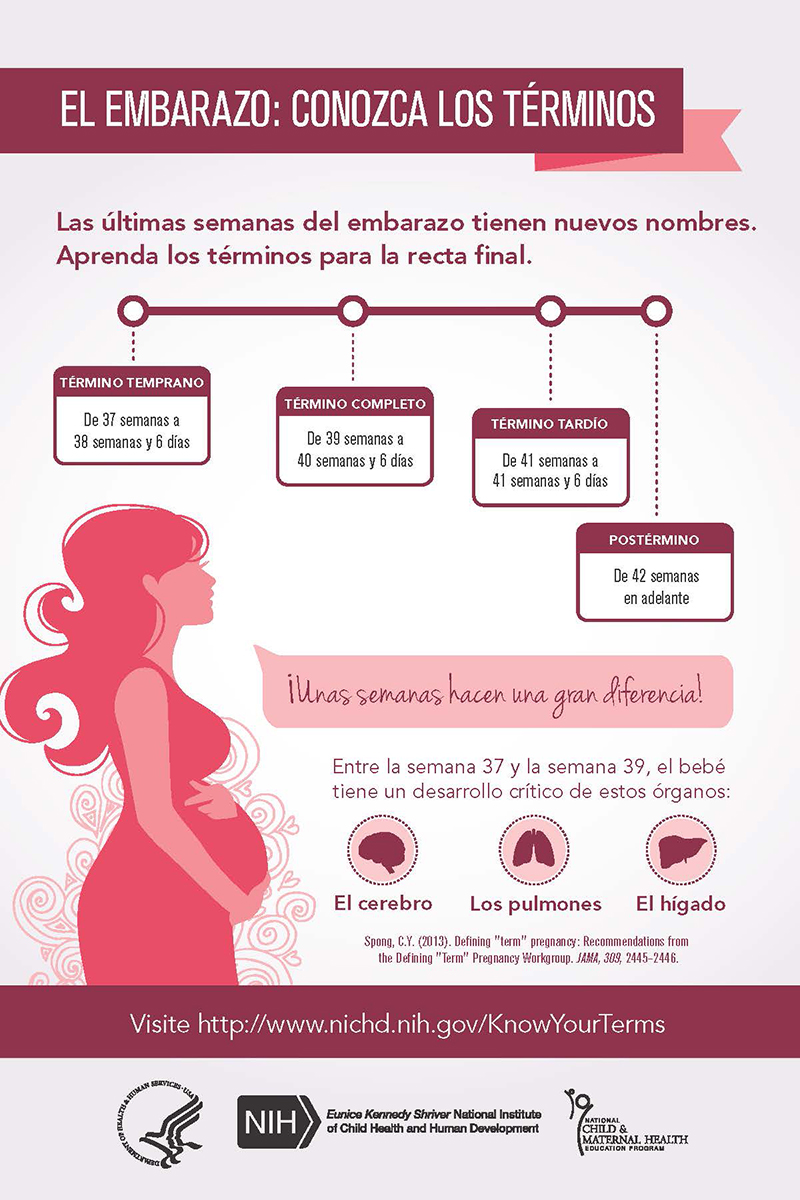
Tarjeta postal: "El embarazo: Conozca los términos" (paquetes de 25 postales cada uno)
Texto alternativo
Know Your Terms - Videos
Know Your Terms - Digital Only Materials
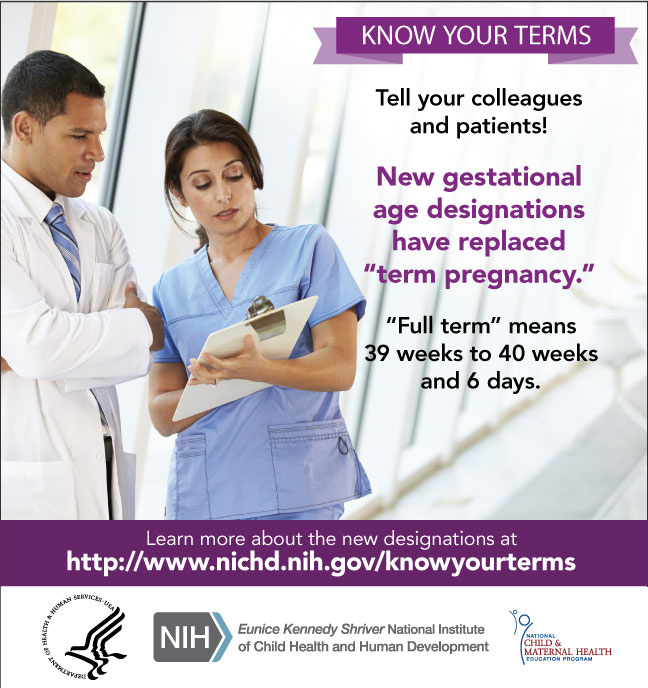
Know Your Terms Infocard for Providers (648 x 688)
Download JPEG (98 KB)
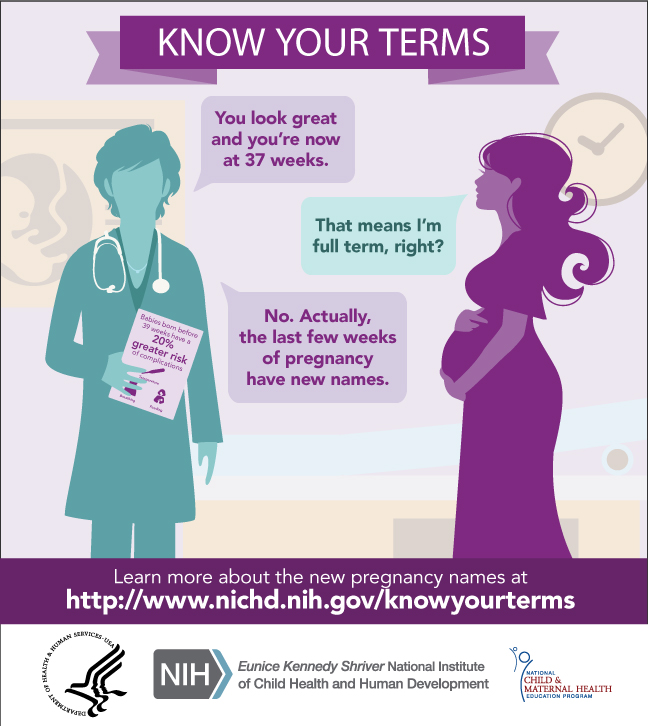
Know Your Terms Infocard for Consumers (648 x 726)
Download JPEG (205 KB)
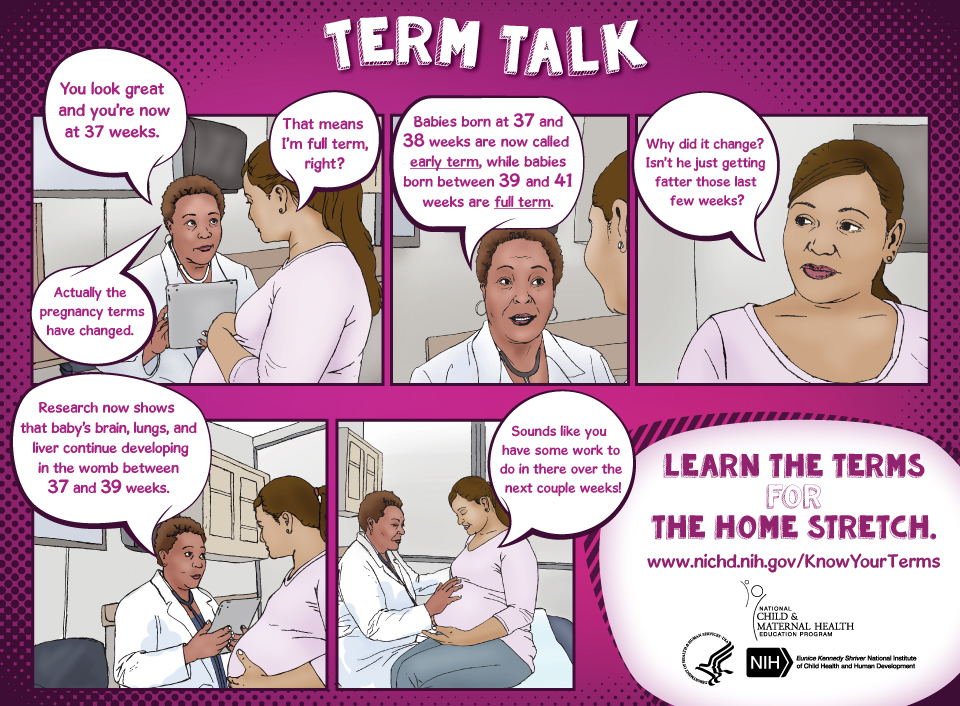
Term Talk Infocard for Providers (960 x 706)
Text Alternative
Download JPEG (619 KB)
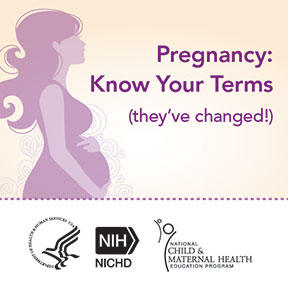
Know Your Terms Online Badges
Embed Code
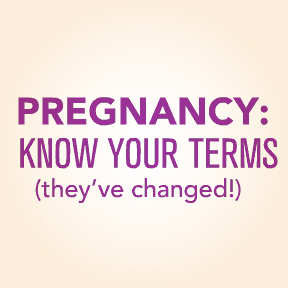
Know Your Terms Animated GIFs
Embed Code
Know Your Terms - Shareable Messages
Mom's Mental Health Matters
Print Materials
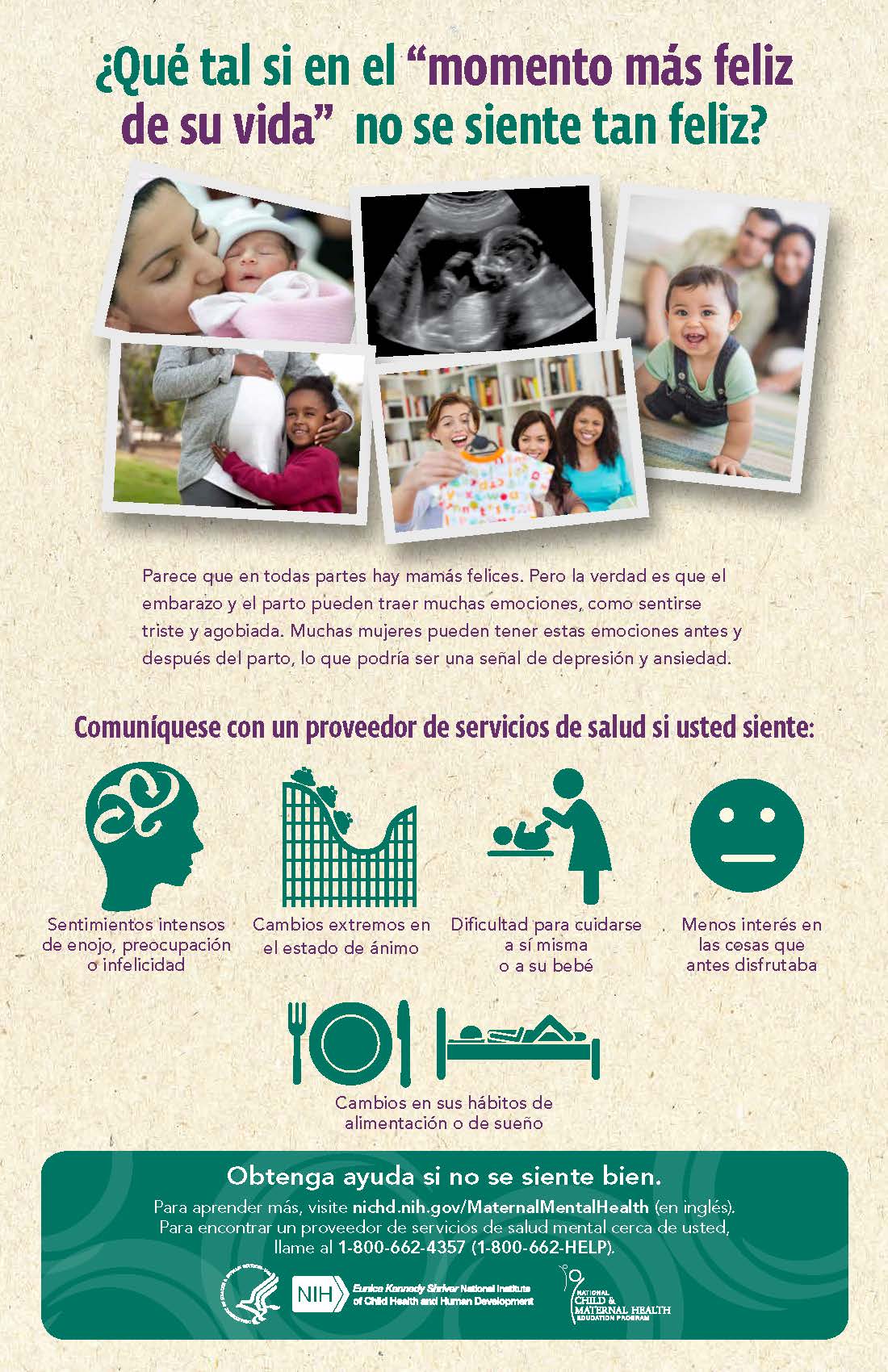
¿Qué tal si en el "momento más feliz de su vida" no se siente tan feliz? (17" x 23")
Texto alternativo
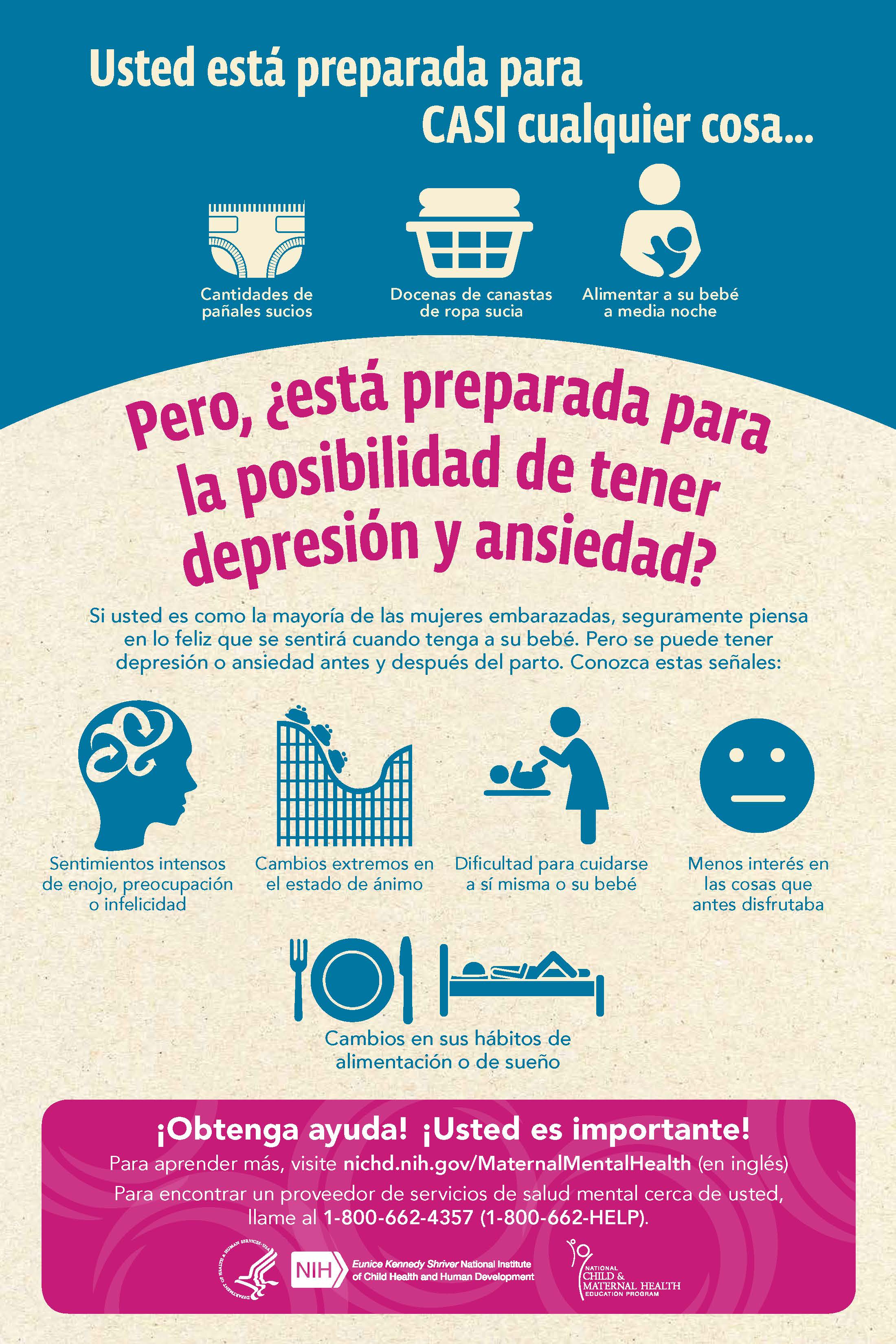
Póster: Usted está preparada para CASI cualquier cosa (17" x 23")
Texto alternativo
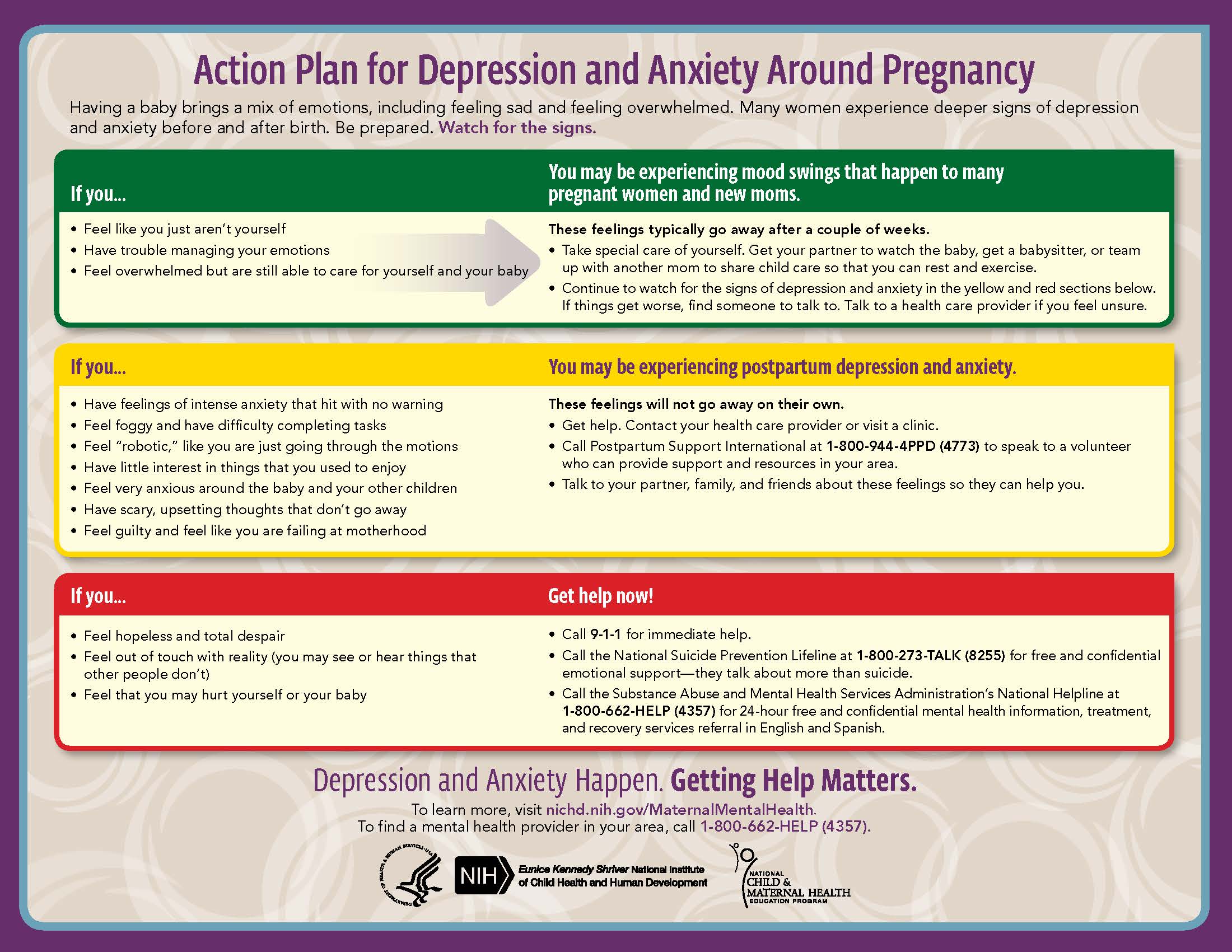
Moms' Mental Health Matters Action Plan Tear Pad (50 sheets per pack)
Text Alternative
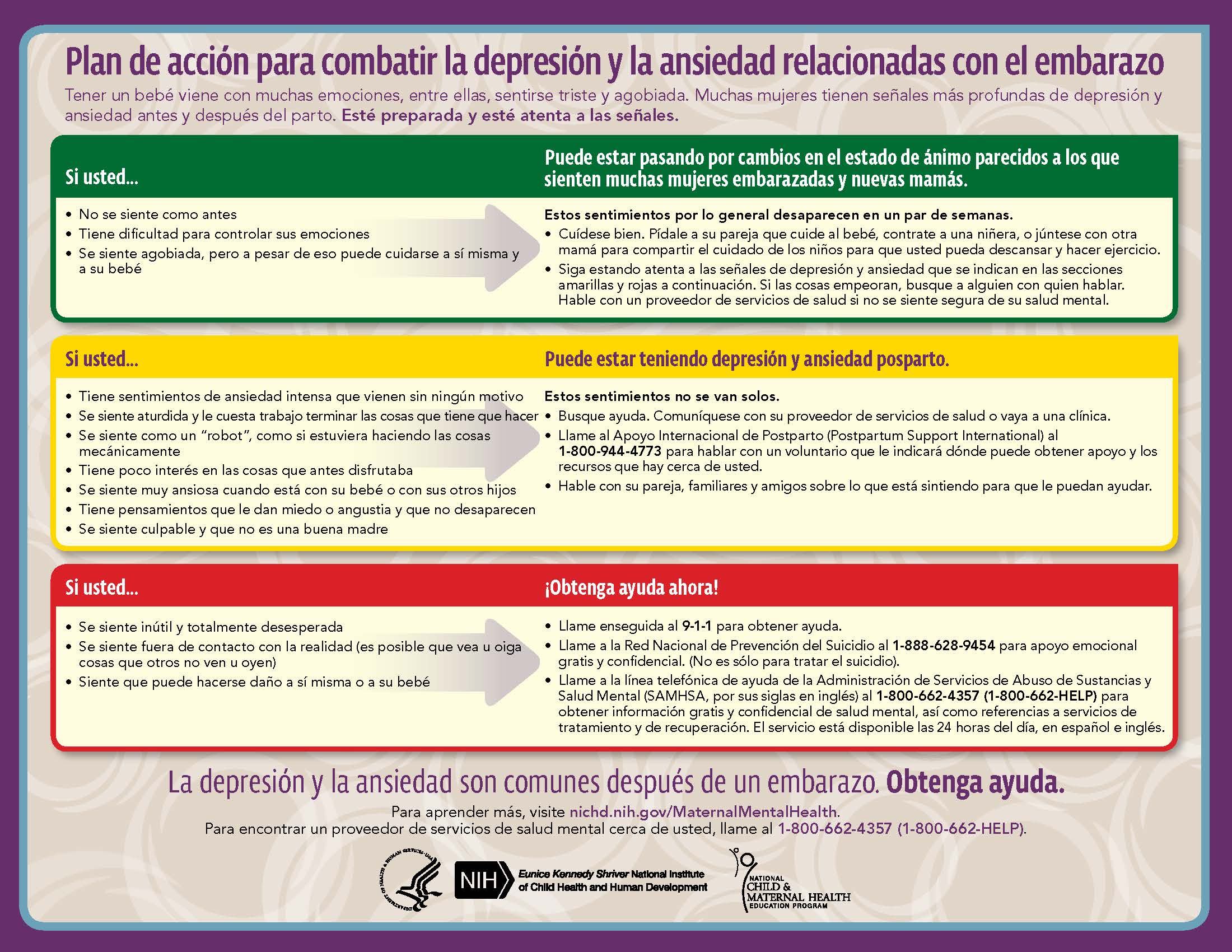
Talonario: Plan de acción para combatir la depresión y la ansiedad relacionadas con el embarazo (50 hojas por talonario)
Texto alternativo
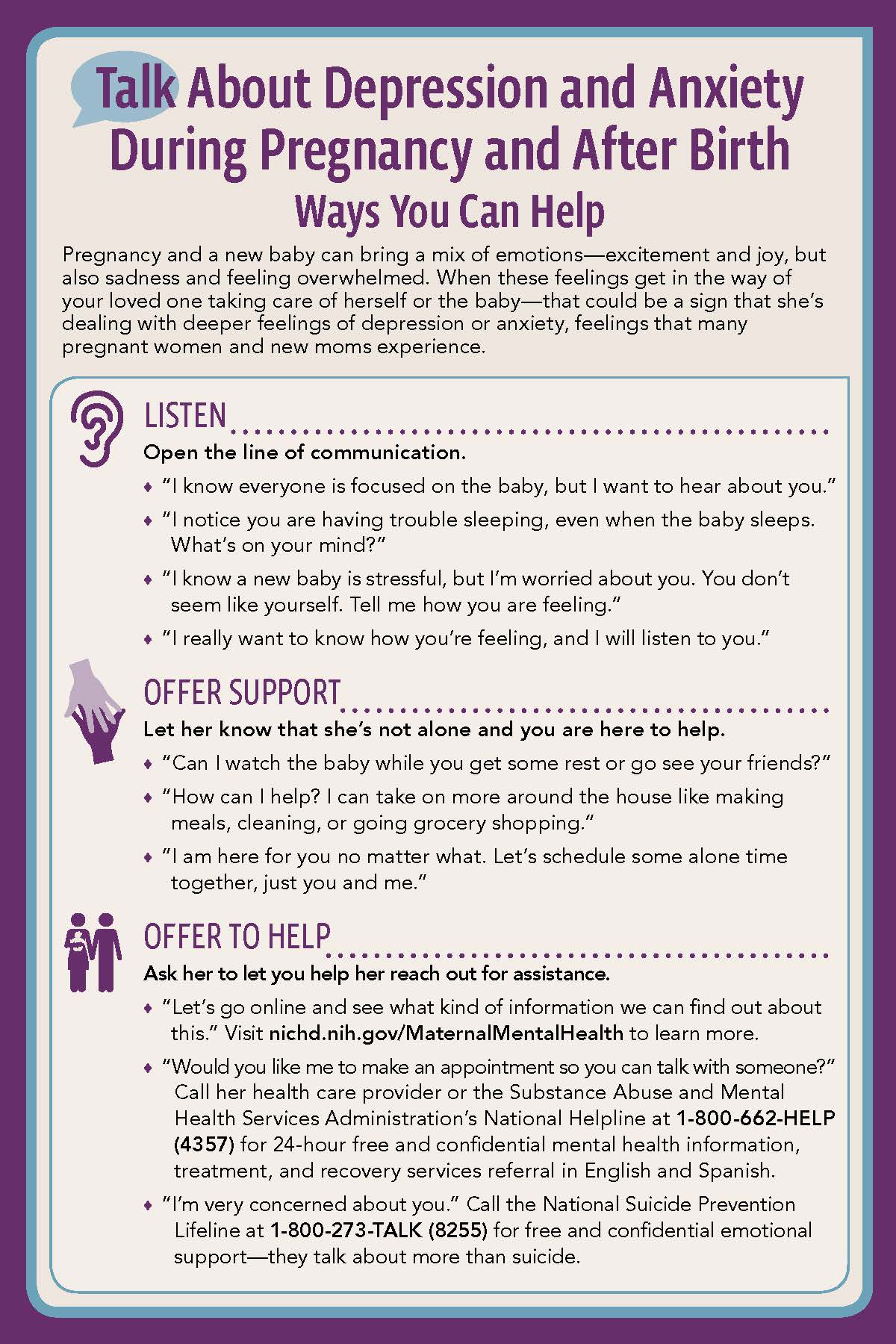
Moms' Mental Health Matters Conversation Starter Postcard (50 cards per pack)
Text Alternative
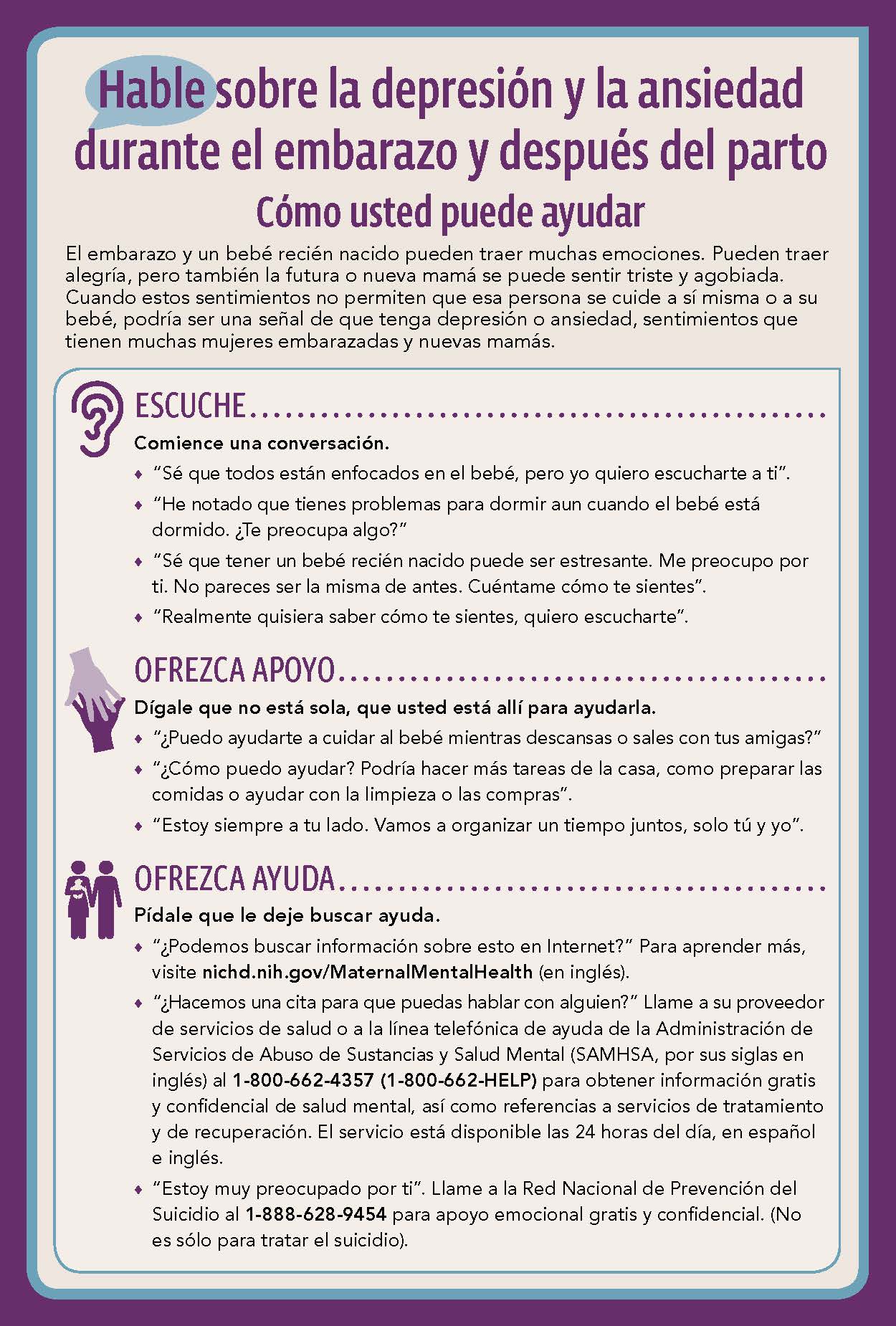
Tarjeta postal: Hable sobre la depresión y la ansiedad durante el embarazo y después del parto (paquetes de 50 postales cada uno)
Texto alternativo
Videos
Pregnancy For Every Body
Pregnancy For Every Body - Print Materials
For Moms-To-Be
For Healthcare Providers
Find more information from our partners and other organizations on our Resources page.
Pregnancy For Every Body - Shareable Messages
Download and share social media-ready graphics from our Flickr album .
For moms-to-be
- Be your own advocate. Ask your healthcare provider about all of your #pregnancy risks and how best to address them, then make a healthy pregnancy plan together. http://bit.ly/3842rK5 #Pregnancy4EveryBody @NICHD_NIH
- Working with a healthcare provider who will treat you with respect and kindness, and whom you trust, is important for a healthy #pregnancy. Learn how you can find a provider who’s right for you. Then make a plan together. http://bit.ly/3842rK5 #Pregnancy4EveryBody @NICHD_NIH
- You and your healthcare provider have the same goals: a healthy #pregnancy, a safe delivery, and a healthy baby. Talk to your healthcare provider about what a healthy #pregnancy plan looks like for you. http://bit.ly/3842rK5 #Pregnancy4EveryBody @NICHD_NIH
- Body mass index (#BMI) is used to understand general health risks. Knowing this and other health information helps your healthcare provider create a healthy #pregnancy plan for you. Learn more. http://bit.ly/2DTmq0t #Pregnancy4EveryBody @NICHD_NIH
- Having a BMI of 30 or higher is linked to higher risk of pregnancy complications such as gestational diabetes. Getting early and regular prenatal care will help your provider watch for these risks. Learn more. http://bit.ly/2DTmq0t #Pregnancy4EveryBody @NICHD_NIH
- Most plus-size pregnant women have healthy pregnancies, especially if they manage their weight gain, get regular prenatal care, and have a birthing plan in place for their labor and delivery. Talk to your healthcare provider about creating a healthy pregnancy plan for you. http://bit.ly/3842rK5 #Pregnancy4EveryBody @nichdgov
- Working with a healthcare provider who will treat you with respect and kindness, and whom you trust, is important for a healthy pregnancy. Learn how you can find a provider who’s right for you. Then make a plan together. http://bit.ly/3842rK5 #Pregnancy4EveryBody @nichdgov
- Having a BMI of 30 or higher is linked to higher risk of pregnancy complications such as gestational diabetes. Getting early and regular prenatal care will help your provider watch for these risks. http://bit.ly/2DTmq0t #Pregnancy4EveryBody @nichdgov
- Be More Informed. Research shows that a body mass index (BMI) of 30 or higher before pregnancy is linked to higher risk of pregnancy complications. Talk to your healthcare provider about creating a healthy pregnancy plan for you. http://bit.ly/2DTmq0t #Pregnancy4EveryBody @nichdgov
- Healthy pregnancies are for every body! Whatever your body size or shape, you can work with your healthcare provider to create a pregnancy plan tailored to your specific needs. Learn how you can start the conversation with your provider. See link in bio. @nichd_nih #Pregnancy4EveryBody #Pregnancy #MaternalHealth #NICHD #HealthyPregnancy
Add to your profile bio this link: http://bit.ly/3842rK5 - Moms-to-be: Body mass index (#BMI) is one piece in the overall puzzle of providing care. Talk to your healthcare provider to learn about all factors that affect healthy pregnancy outcomes, including BMI, family and health history, and lifestyle. See the link in bio to learn more. @nichd_nih #Pregnancy4EveryBody #Pregnancy #MaternalHealth #NICHD #HealthyPregnancy
Add to your profile bio this link: http://bit.ly/2DTmq0t
Sample Blog Post
Questions to Ask Your Doctor During Your First Prenatal Appointment
Congratulations on your pregnancy! It may feel overwhelming as you start making plans for your baby, but know that you can take it one step at a time.
Even though plus-size women face increased risks when they become pregnant, most plus-size women have healthy pregnancies and healthy babies, especially if they manage their weight gain, get regular prenatal care, and have a birthing plan in place for their labor and delivery. Pregnancy for Every Body aims to help pregnant women and their providers work toward these ultimate goals: healthy pregnancies, safe deliveries, and healthy babies.
Once you have found a healthcare provider who treats you with respect and whom you trust, talk to him or her about your current health, health history, lifestyle, and other factors that may affect your pregnancy.
You can start the conversation by asking the following questions at your first appointment:
- Does my health history put me at risk for any health problems during my pregnancy?
- Given my starting weight and medical history, how much weight should I gain during pregnancy?
- How can I create a healthy eating plan that is best for me and my baby?
- How much physical activity (and what types of activity) should I do during my pregnancy?
- Will my care plan change during my pregnancy? What tests and procedures will I need?
Get a printer-friendly version (PDF 706 KB) of these questions and why the answers are important to bring to your next appointment. There is extra space for you to write your own questions on the back.
It is also important for you to start thinking about how you can have a healthy pregnancy. This Pregnancy Action Plan contains a series of questions to help you set goals and plan steps to reach them. Download the full action plan and bring a completed copy to your next appointment. You and your provider can use the action plan to create a pregnancy plan based on your goals, current health, and lifestyle.
Healthy pregnancies are for every body! Be more informed about your care and your needs during pregnancy. For more information on how you can work with your healthcare provider, visit https://nichd.nih.gov/Pregnancy4EveryBody.
For healthcare providers
- DYK? #PlusSize pregnant women may delay or avoid prenatal care because they are afraid of being shamed or judged by their healthcare providers. Learn how you can discuss weight in a sensitive way. http://bit.ly/35ZZWqy #Pregnancy4EveryBody @NICHD_NIH
- Do you see #PlusSize pregnant women? You can find tips informed by @acog’s
practice guidelines for caring for pregnant women who are overweight or obese before, during, and after #pregnancy. http://bit.ly/35ZEr96 #Pregnancy4EveryBody @NICHD_NIH
- Plus-size pregnant women want to understand all of the factors that affect pregnancy outcomes. Listen and collaborate with your patients to ensure that you address all of their pregnancy concerns, and work with them toward a healthy pregnancy. http://bit.ly/35ZEr96 #Pregnancy4EveryBody @nichdgov
- Healthcare providers: Pregnant women who are overweight or obese are more than just their BMI. Talk to them about their health history and risk factors, then create a healthy pregnancy plan together. http://bit.ly/2Pd07bj#Pregnancy4EveryBody @nichdgov
- Do you see plus-size pregnant women? Get tips on providing high-quality, comprehensive, and respectful care informed by the @ACOGNational guidelines. Learn more. http://bit.ly/35ZEr96 #Pregnancy4EveryBody @nichdgov
- Plus-size pregnant women want to understand all factors that affect healthy pregnancy outcomes. Healthcare providers can help women be more informed by discussing factors, such as BMI, health history, and lifestyle. Learn how to start the conversation about these important factors with patients. http://bit.ly/2Pd07bj @National Institute of Child Health and Human Development
#Pregnancy4EveryBody #Pregnancy #MaternalHealth #HealthcareProviders
- You and your pregnant patients share common goals: a healthy pregnancy, safe delivery, and a healthy baby. Learn how you can support your plus-size patients, while providing high-quality, comprehensive, and respectful care. http://bit.ly/35ZEr96 @National Institute of Child Health and Human Development
#Pregnancy4EveryBody #Pregnancy #MaternalHealth #HealthcareProviders
Sample Blog Post
Start the Conversation About Weight and Pregnancy
Research finds that women with a BMI of 30 or higher have a higher risk of health complications during pregnancy and after delivery. Plus-size women can have healthy pregnancies and healthy babies, especially if they get regular prenatal care and work with you to create a personalized pregnancy plan. Providers want to deliver quality care with respect and compassion to all patients, but evidence suggests that some providers hold an implicit bias against people who are overweight or obese. This bias may prevent effective communication and harm the physician-patient relationship. Women who feel shamed or judged by their provider often delay or avoid prenatal care.
Pregnancy for Every Body collaborated with the American College of Obstetricians and Gynecologists (ACOG) and other provider groups to gather resources and recommendations on providing prenatal care to women with obesity. These resources include:
- A self-check for implicit bias
- A tip sheet to help guide conversations with plus-size pregnant women
- A checklist of suggested tips for supporting plus-size women before, during, and after pregnancy
Working with your patients means empowering pregnant women by framing BMI as just one factor in a healthy pregnancy, and by educating them about using BMI and other risk classifications to develop individual healthy pregnancy plans.
Encourage patients to ask questions and work together to address their specific needs. For more information and resources on caring for plus-size pregnant women, visit https://nichd.nih.gov/Pregnancy4EveryBody.

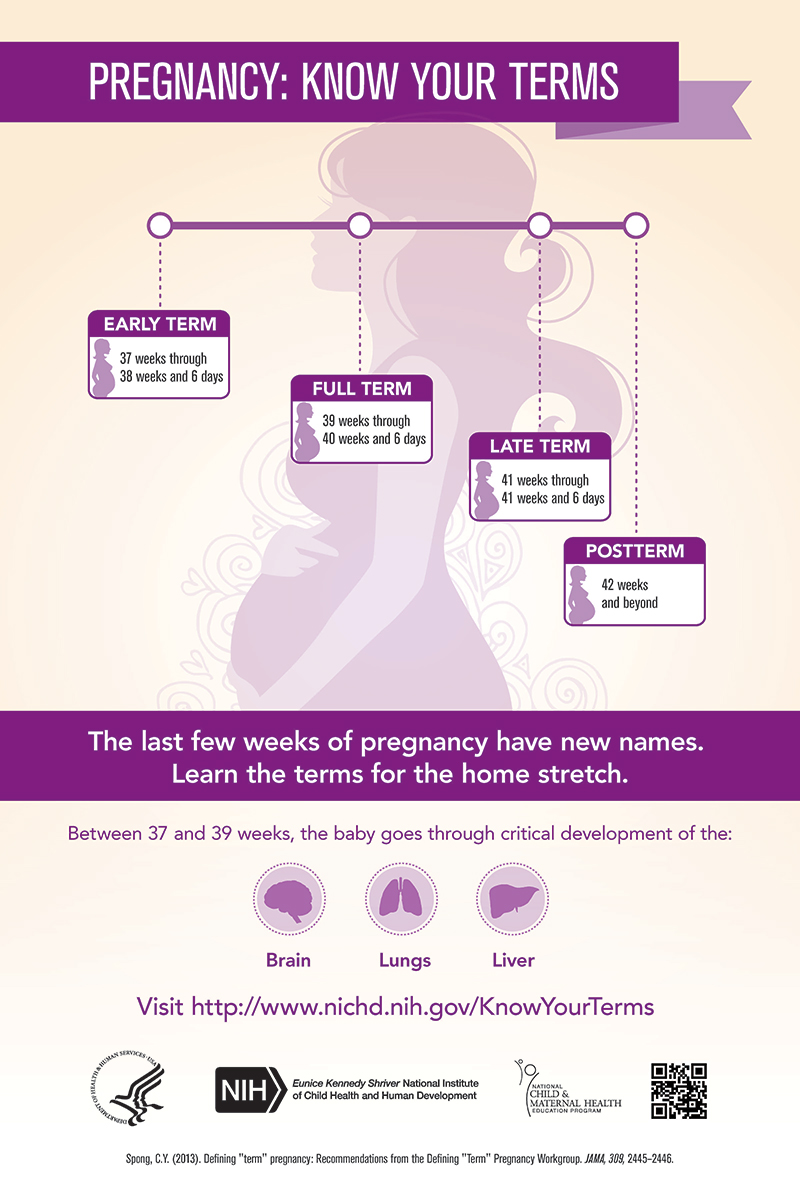
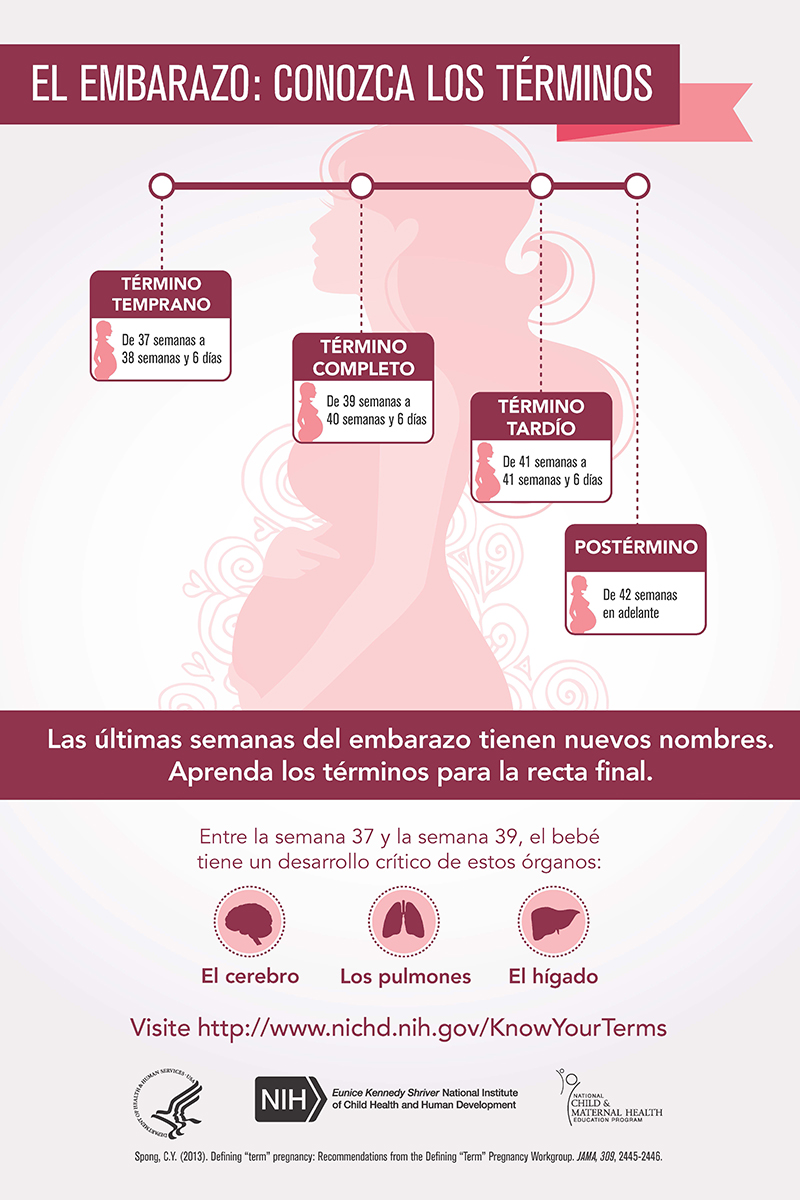
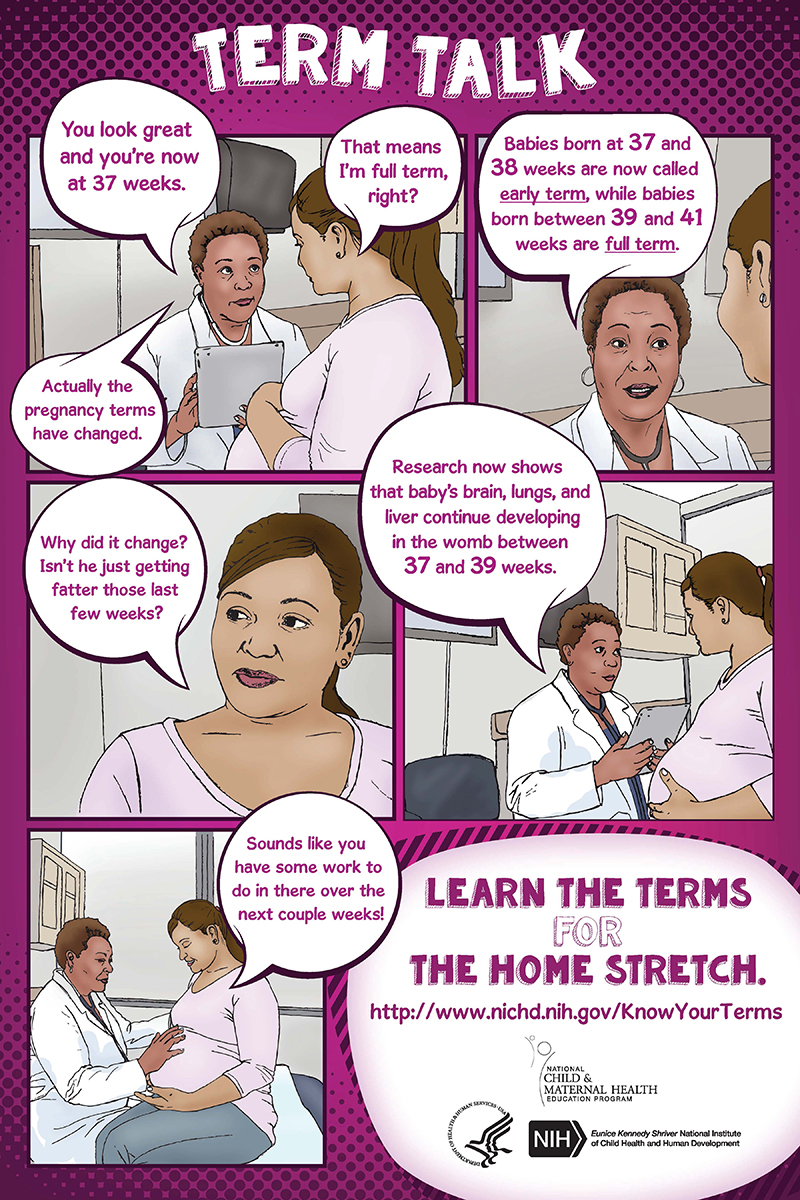
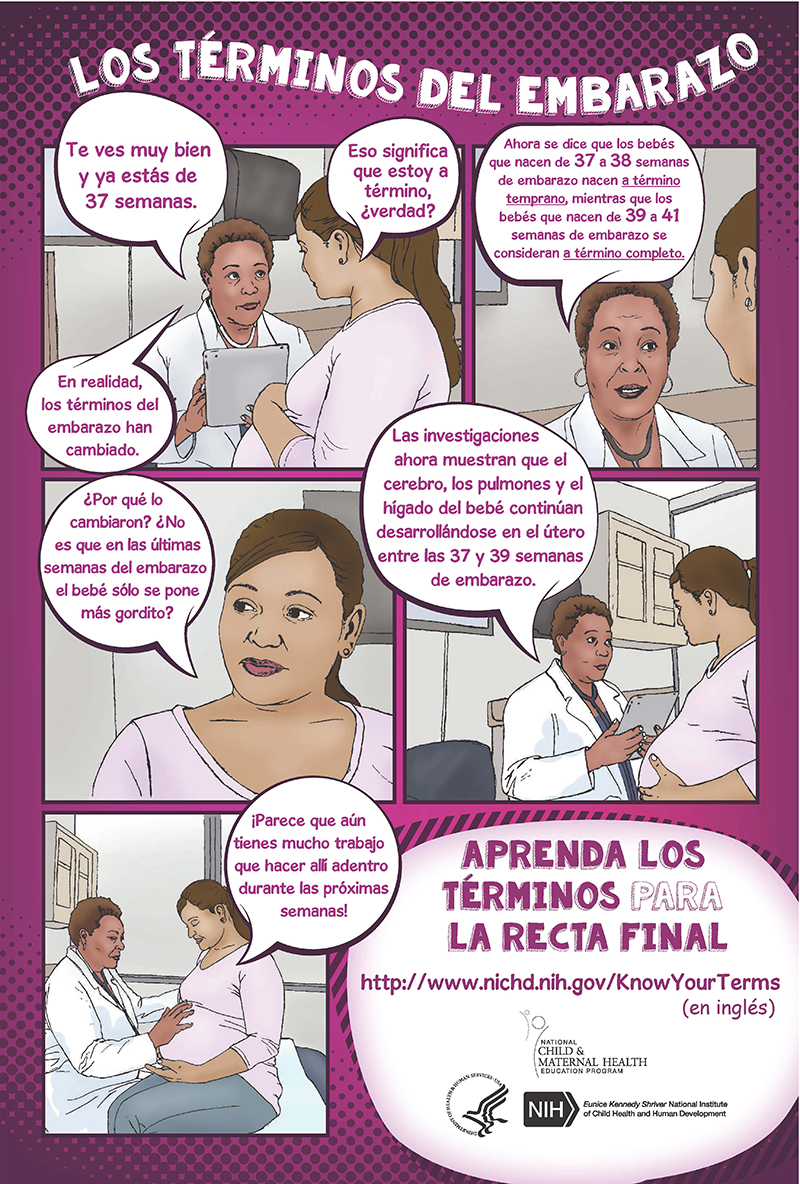
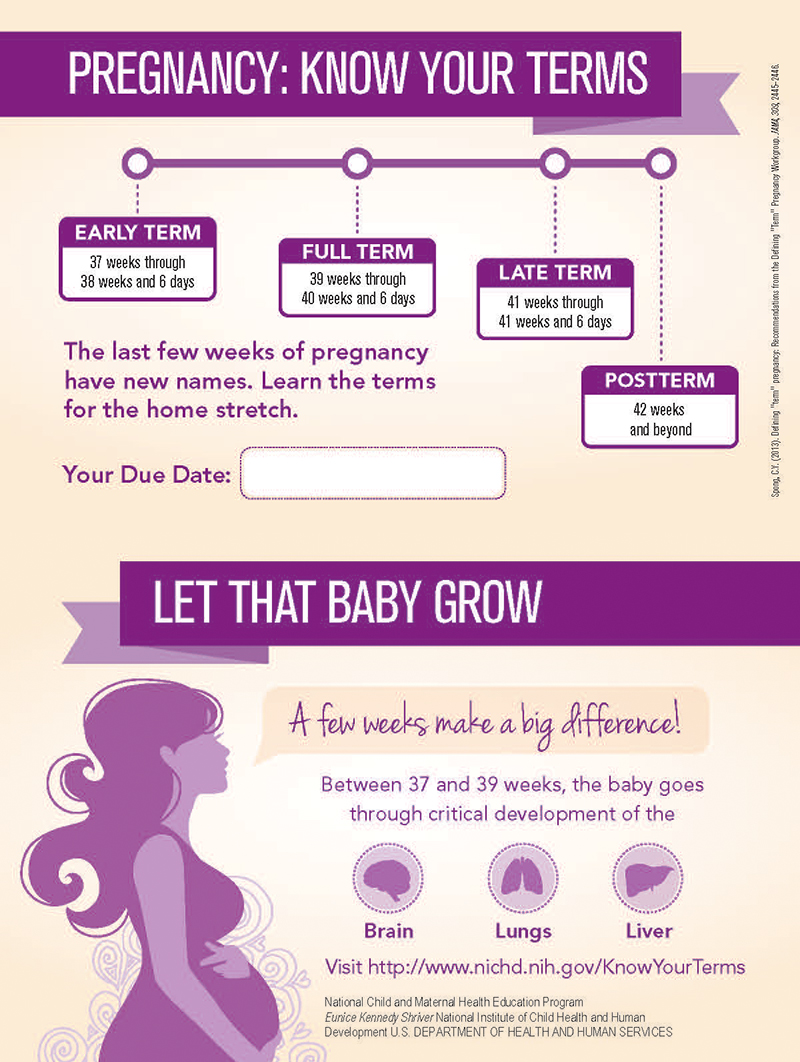
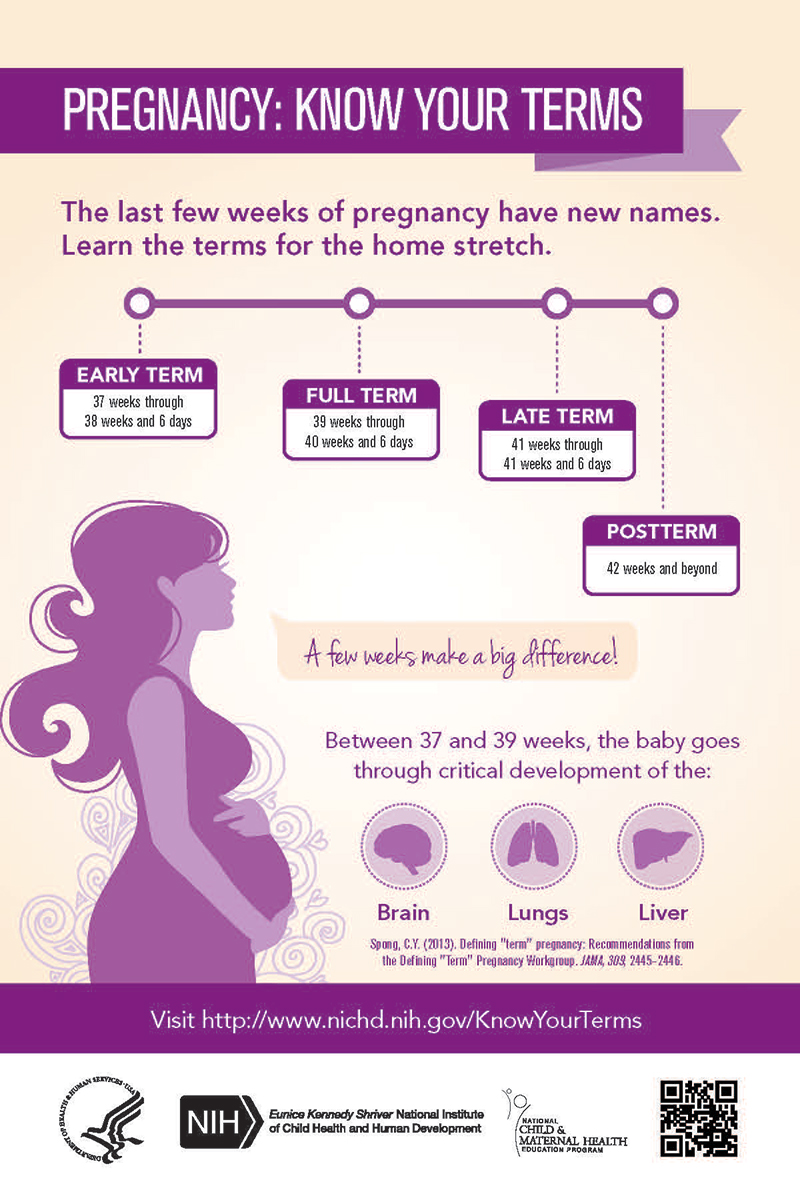




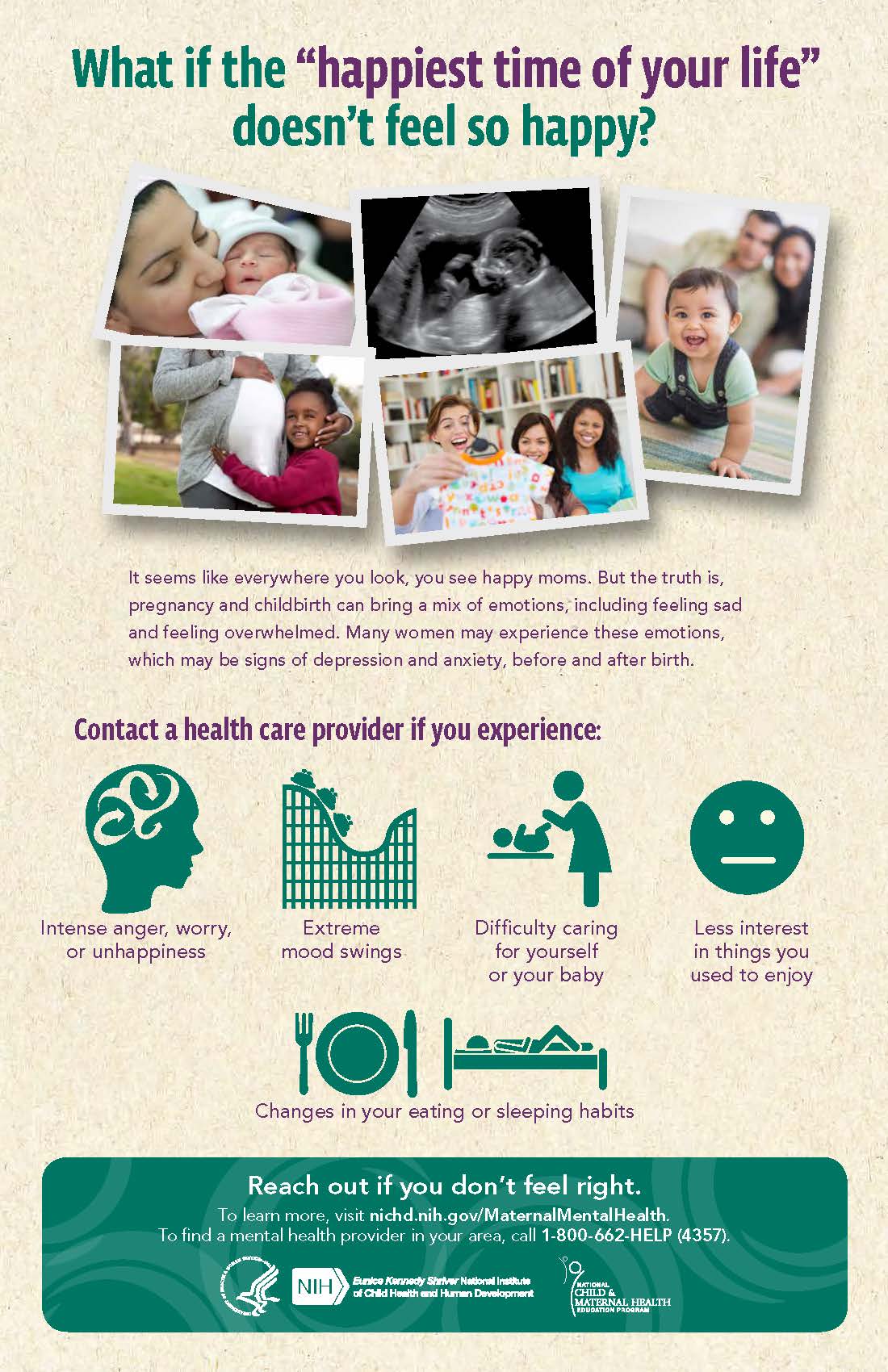
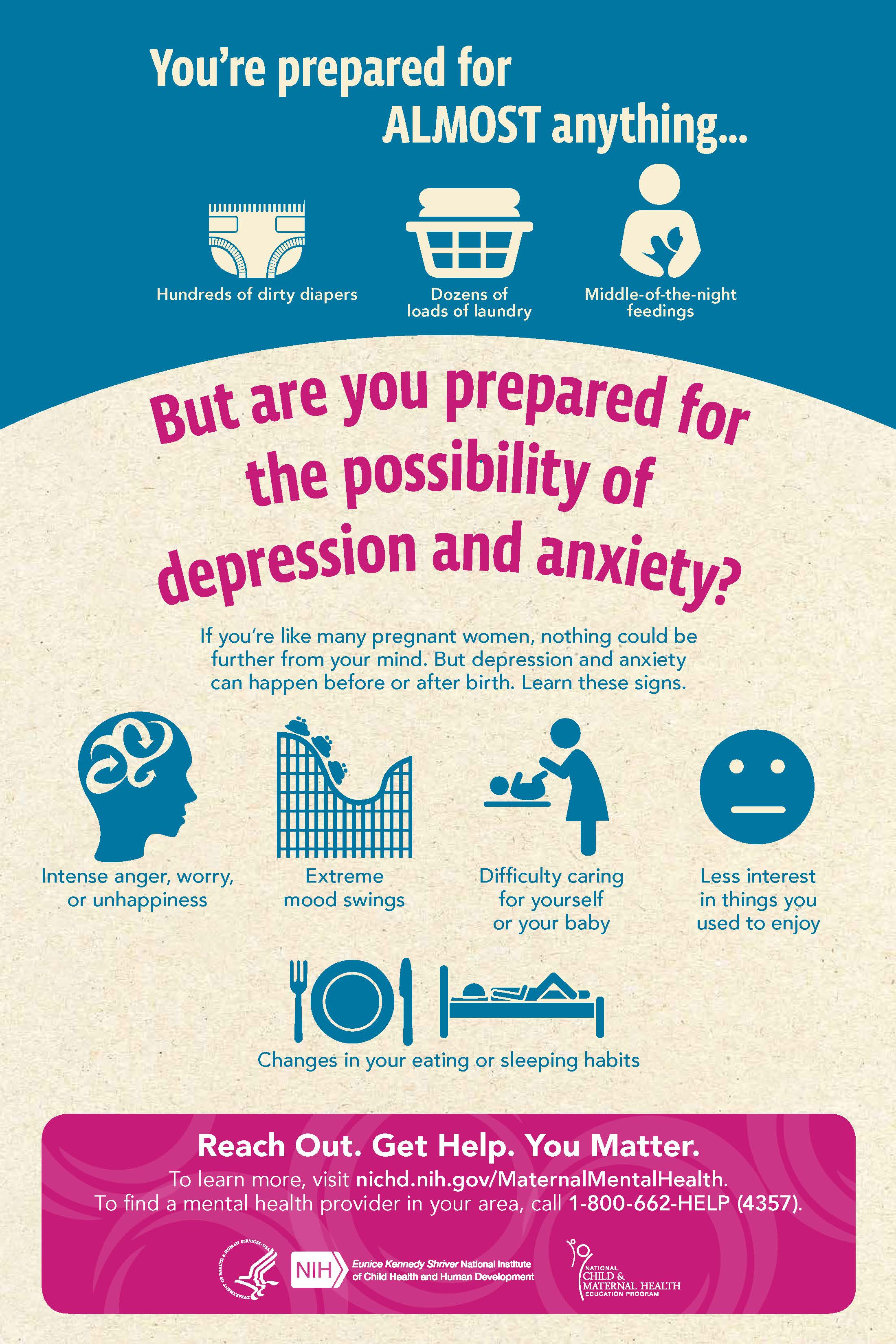
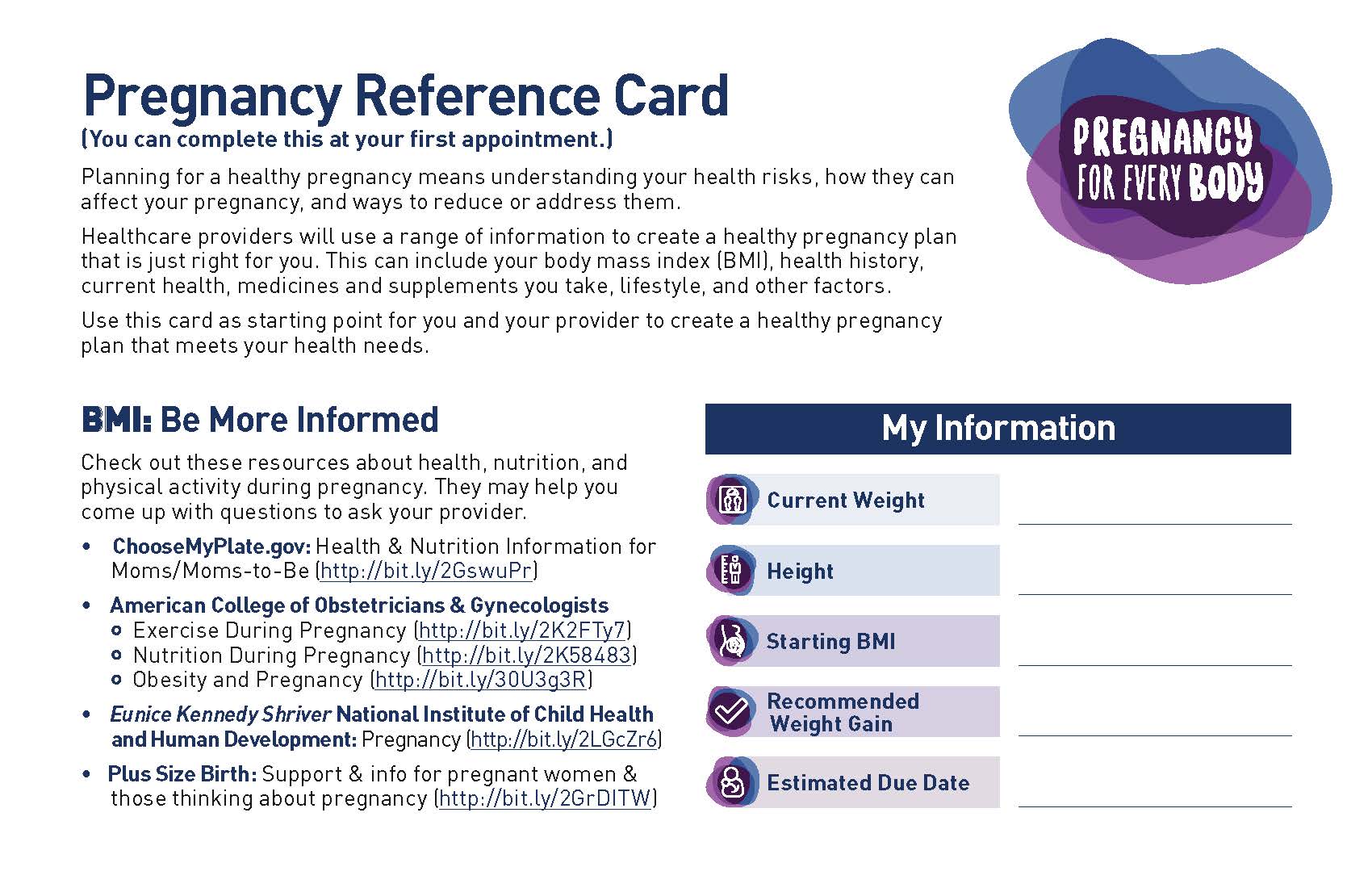
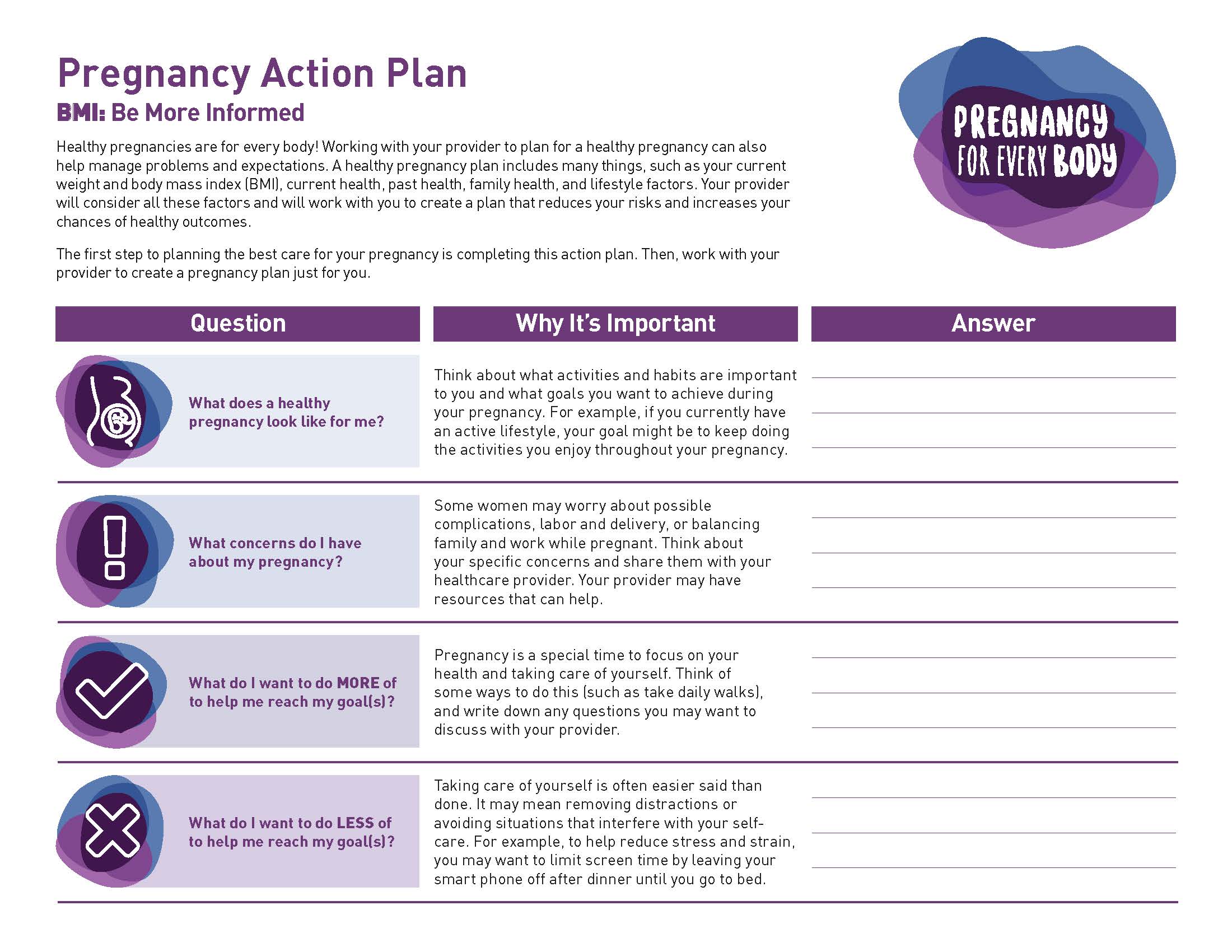
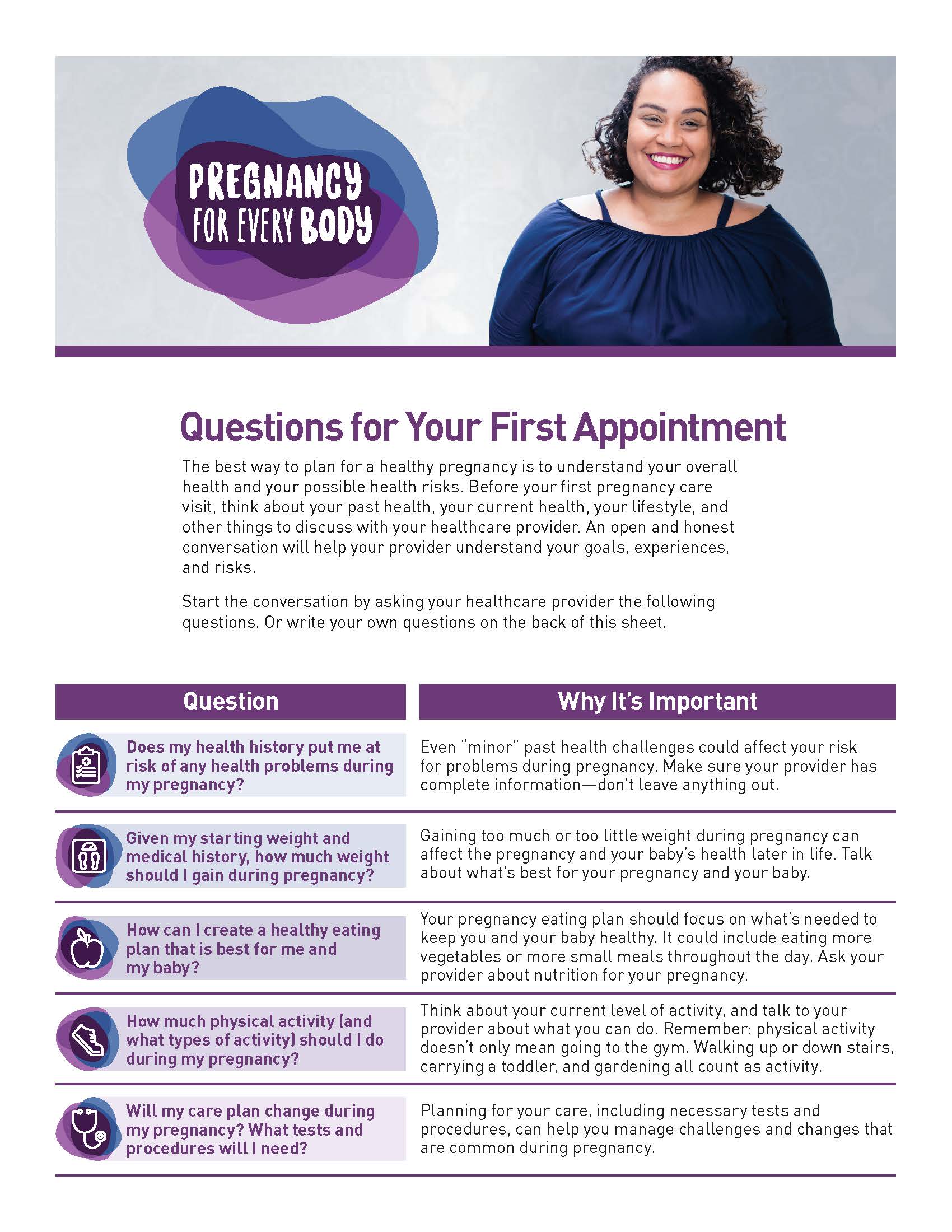
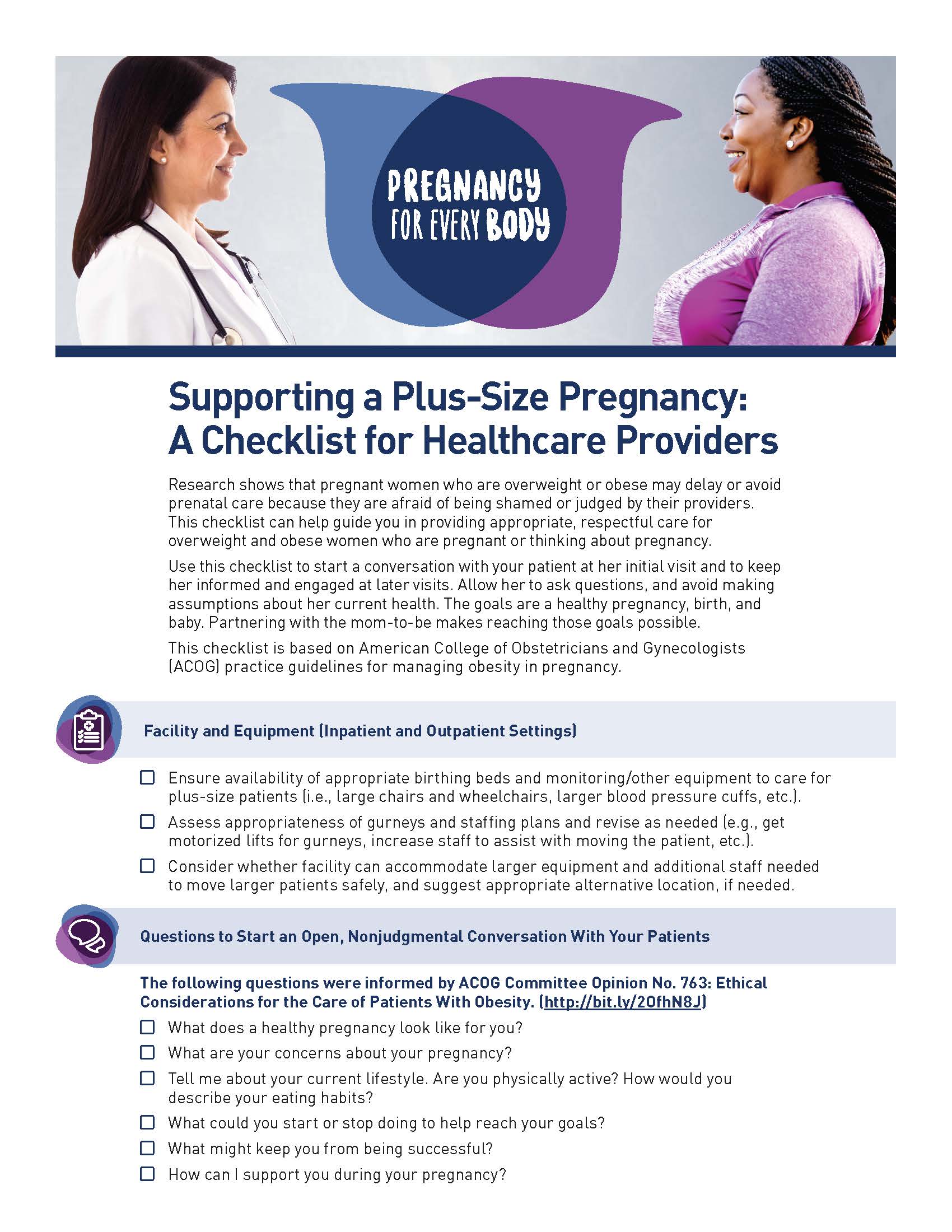
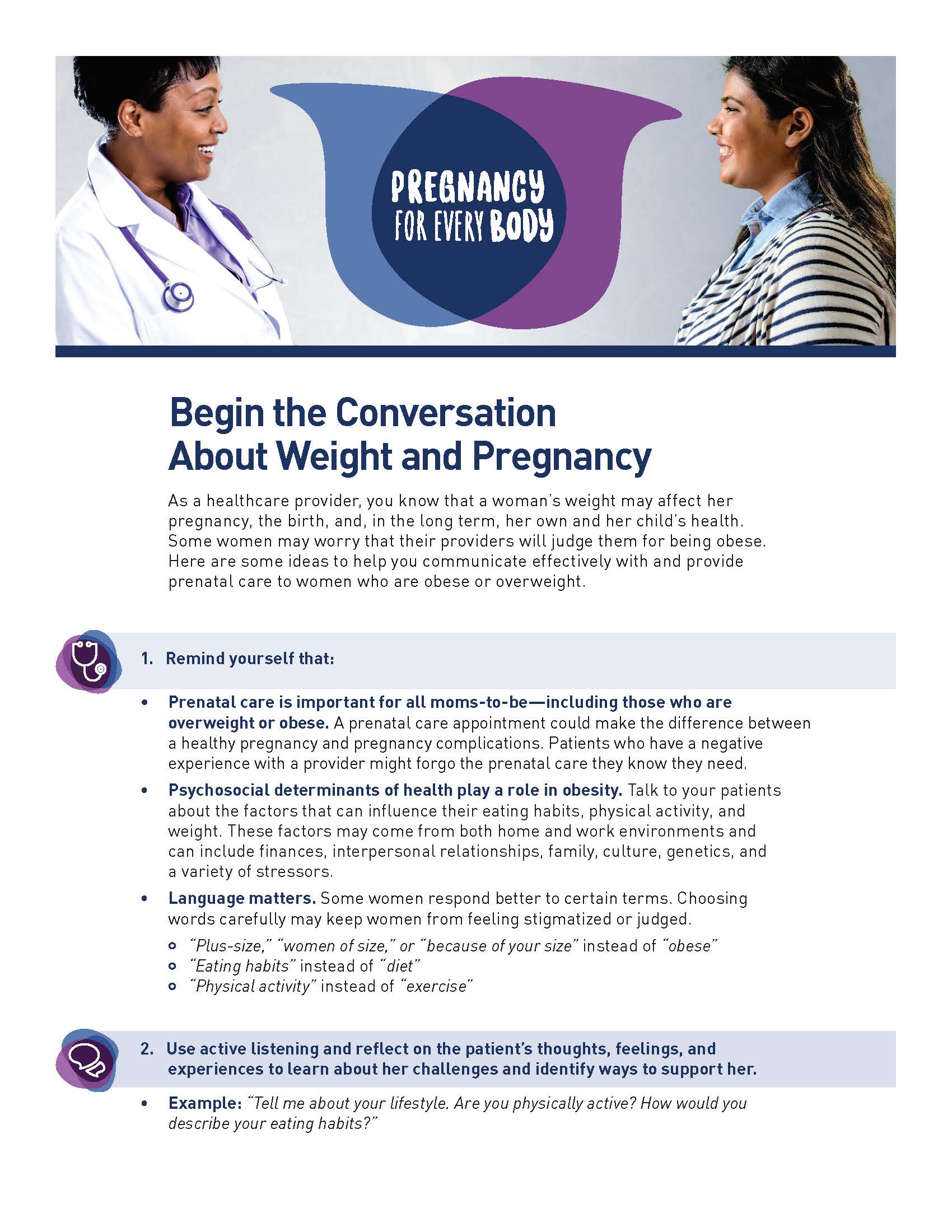
 BACK TO TOP
BACK TO TOP